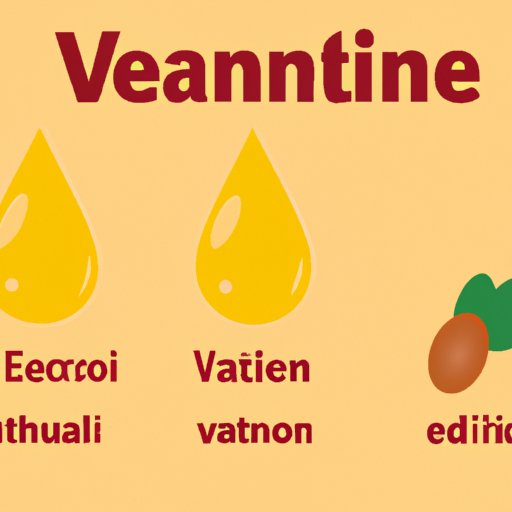
Introduction
Vitamin E is a crucial nutrient for the human body. It plays an important role in maintaining healthy skin, hair, and eyesight. With all the information surrounding the importance of vitamin E, there’s still confusion on whether it is water-soluble or not. In this article, we aim to provide clarity on this topic and discuss the significance of vitamin E in our everyday lives.
Understanding Vitamin E
Vitamin E is a fat-soluble vitamin that exists in eight different forms. It functions like an antioxidant, which means it protects cells from damage caused by free radicals in the body. Free radicals accelerate the aging process and predispose an individual to diseases like cancer and heart problems.
Vitamin E boosts the immune system and helps regulate gene expression. It also plays a role in the production of red blood cells.
Absorption of Vitamin E
Vitamin E is absorbed in the small intestine and is transported to the liver. From there, it is sent throughout the body with the help of lipoproteins or fat particles. Vitamin E requires the presence of dietary fat to be absorbed.
Despite being a fat-soluble vitamin, vitamin E is not water-soluble. This means it does not dissolve in water, unlike vitamin C.
Differences Between Water-Soluble and Fat-Soluble Vitamins
Water-soluble vitamins, like vitamin C and B-complex vitamins, dissolve in water. They are not stored in the body and are easily excreted in urine. This means that an individual needs to consume them regularly to prevent deficiencies.
On the other hand, fat-soluble vitamins like vitamin E, A, D, and K require dietary fats and bile to be absorbed. They can be stored in the liver and adipose tissue, and excessive intake can lead to toxicity.
Importance of Consuming Vitamin E
Consuming enough vitamin E is essential for maintaining a healthy body. It helps reduce the risk of heart disease and some types of cancer. Vitamin E strengthens the immune system and improves skin health, preventing premature aging. It also promotes healthy eyesight, reducing the risk of cataracts and other eye problems.
Identifying Vitamin E Deficiency
A vitamin E deficiency is rare. People at risk of a deficiency are those who cannot absorb dietary fats like those with Crohn’s disease or cystic fibrosis. The symptoms of deficiency include muscle weakness, poor coordination, and slow reflexes. Vitamin E deficiency can lead to neurological problems and anemia.
Best Food Sources of Vitamin E
The best food sources of vitamin E include nuts and seeds, like almonds and sunflower seeds. Plant oils, like olive and sunflower oils, are also high in vitamin E. Dark leafy greens and avocado are other great sources of the vitamin. It’s important to note that overcooking foods can destroy the vitamin E content, so it’s best to eat these foods raw or lightly cooked.
Ensuring sufficient amounts of vitamin E in meals is not difficult. A handful of almonds or a drizzle of olive oil in a salad is enough to meet the daily recommended allowance of vitamin E.
Effects of Consuming High Doses of Vitamin E
A regular intake of vitamin E is safe for most people. The recommended daily allowance for adults is 15 milligrams. However, taking high doses of vitamin E supplements can lead to toxicity, which can cause bleeding and adversely affect thyroid function. It’s important to regulate vitamin E intake and not exceed 1,000 milligrams per day.
Conclusion
Vitamin E is a vital component in maintaining overall health, and its benefits are manifold. While it’s not water-soluble, it’s still important to consume daily to prevent deficiencies. It plays an important role in protecting cells from damage, maintaining the immune system, and promoting healthy eyesight. Consuming sufficient amounts of vitamin E in meals is not difficult, and it’s a habit worth cultivating to maintain health and vitality.





